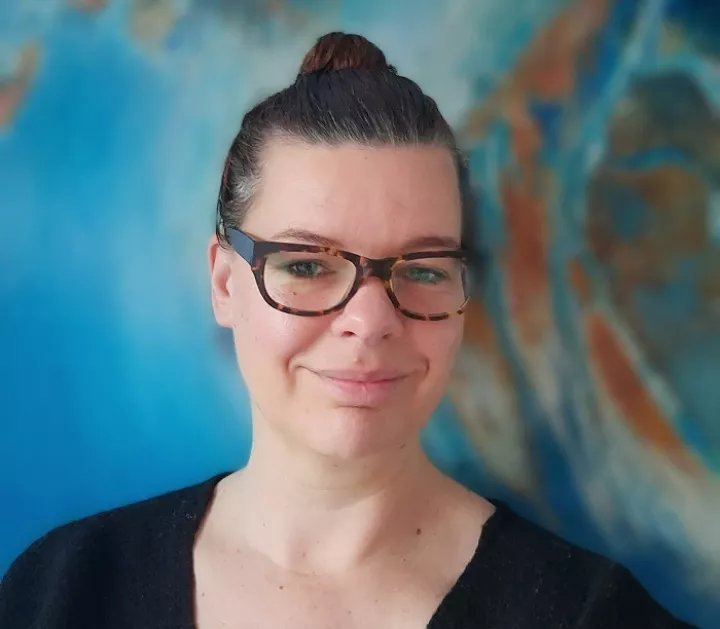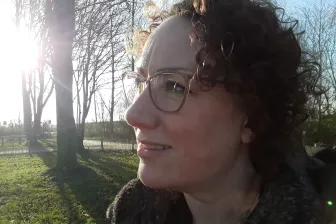Katja Nijland works as a psychosocial advisor at Victim Support Netherlands. Before that, she worked as a case manager for several years, helping victims and relatives of the deceased after severe cases of violence, sexual violence and homicide. “During the meetings in which I was present, every time, I saw two people who were trying to recover.”
Katja mentioned the subject of restorative mediation in basically every case she worked on. “I think victims should have the choice. I didn’t mention it immediately during the first conversation, sometimes only after a few weeks. But I always mention it eventually. I’ve also personally developed in that respect. In the beginning, my only perspective was the story the victim told me. Over the years that perspective has expanded to that of the offender. You can never condone or understand the act, but you do learn that sometimes a lot of things happened in the life of the offender leading up to that moment. I’ve really learned to see the human behind the offender.
“The recovery process is a lot of hard work for a victim. It’s not just a matter of letting time pass. Recovering is a verb. If you want to get out of the victim role, you have to work very hard for it. And sometimes the choice to get in contact with the offender can help with this. But you need the courage to do it as a victim.
How do you discuss restorative mediation?
“There’s always something to hook onto in a conversation with victims or relatives of the deceased. For example anger, fear, questions, missing puzzle pieces that remain after a court case. ‘Do you want to do something about this anger, would you like to work on that?’ I ask them. To see whether this anger or fear would remain after they saw the offender. And the questions they have, can sometimes only be answered by the offender. Or I tell them: ‘Have a look at the website of Perspectief.’ I always make it clear that they have the choice. You make this step in your recovery yourself. Being open to restorative mediation does not diminish the severity of the crime or the effects you suffered. But it can help you integrate the crime and its effects into your future.”
Armed robbery
“In my last case in which I helped the victims during a mediation, the thing to hook onto was easy to find. A couple had been the victim of an armed robbery in their house. It was a very violent event. I helped the couple as a case manager. You have the final conversation after the court trial and, for example, discuss it when the offender goes on parole. And that they might run into each other by accident. I told them what I wished for them. I wished for them that they would feel less angry and less scared. For them it felt more familiar to stay angry. The offender remained a threat. They kept feeling restless, kept looking over their shoulder. I talked to them about this. After the final conversation, the man kept calling every now and then. About how his wife was dealing with the crime and the consequences very different from him. And then he told me that he had been approached by a mediator from Perspectief to participate in restorative mediation because the offender had taken the initiative from prison.”
Supportive figure
“‘Oh, this is something I really wish for you,’ was my reaction. He wanted me to support them during the meeting. I’ve done that many times before, as a supportive figure. At first, the woman didn’t want to be present during the meeting. She was there during the preparations, so she knew what was going to happen. Eventually she also actively contributed to the conversation.”
‘This is what happened to me, but I don’t want this to keep bothering me for the rest of my life. I want to focus on the future again.’
“Beforehand, the couple had a few questions. Very factual. A few things were left unfulfilled after the court case. But the man also wanted to show the impact that the robbery had on his life. The meeting went very well and was very special. The answers to the questions became less and less important during the conversation. It no longer mattered, for example, who had been the one holding the knife. The man said: ‘This is what happened to me, but I don’t want this to keep bothering me for the rest of my life. I want to focus on the future again.’ He wanted the offender to no longer have such a central role in his life. At the end of the conversation I saw his attitude shift. Both of them had a weight lifted from their shoulders.”
Shame
“The father of the perpetrator was also there. He was full of shame about the fact that his son had committed these actions. Initially, he also didn’t want to say anything, but during the conversation, he opened up. He realized that he had a choice about what to give back to this man. And from then on he was really open to the conversation. He told the couple that he found it terrible for them and that he wanted to help them in any way he could. In that moment, I saw the woman relax as well.”
“This is what you hope will happen, going into it. It couldn’t have gone better than this. For me, it once again confirms that restorative mediation works. Every time, I could see that they are two people who enter into conversation with each other, looking for a way to integrate the event into their futures. I wish this for every offender and every victim who wants to take steps towards their recovery. It’s so wonderful. As a professional, you should really always mention it. You plant the seed and you don’t know whether or when the seed will grow. That’s up to the participants themselves…”

